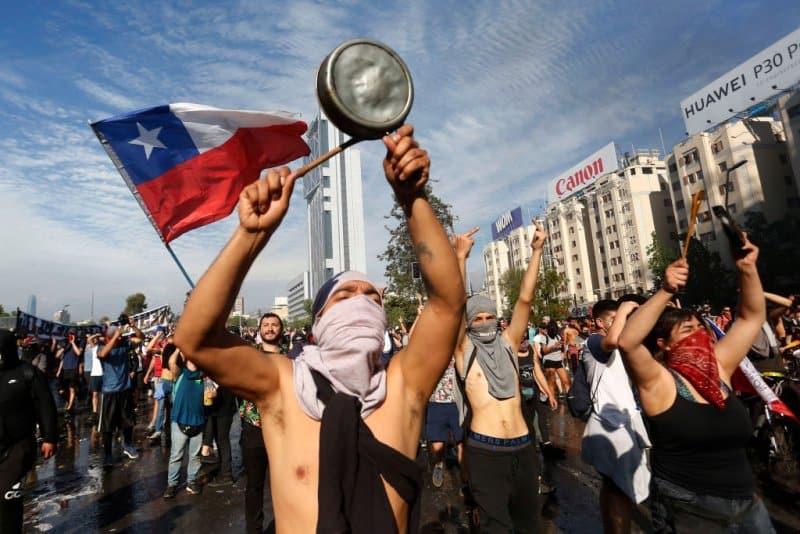by Richard Schulman

Developments in Chile underline the importance of ideas, an insight that needs to be taken up by President Trump and congressional Republicans no less than by Chile’s president, Sebastián Piñera. Chile has the highest standard of living of any country in Latin America and is on the verge of becoming Latin America’s first advanced sector country. For three decades, under both left- and right-leaning governments, Chile has been pursuing free-market-oriented economic policies with spectacular success. But the how and why these policies have succeeded has never been adequately explained and defended by Chilean leaders. Similarly, President Trump has never explained the scientific rationale for taking the US out of the Paris Climate Agreement. He did the right thing, but that’s not enough. He needs to defeat his “Green” Democratic opponents in the battle of scientific ideas. If he can’t do this himself, he should surround himself with prominent scientists and spokesmen who can.
The main problem in Chile is the backwardness and leftist domination of its education system. As Guy Sorman notes in City Journal (Oct. 31, 2019),
Chile’s poverty endures because of the country’s mediocre public education system. Neither the socialist administrations since Augusto Pinochet’s departure nor two free-market governments improved public schools, principally because of powerful, leftist public unions. A neoliberal approach, one that privatized primary schools, could have improved results, but the unions prevailed in their resistance….
Chilean revolutionaries are comparing Piñera with Pinochet, forgetting that the president…opposed the late dictator’s rule. While the Chilean Right has forgotten Pinochet, certain leftists maintain their nostalgia for Salvador Allende and his failed socialist revolution of the 1970s. In Chile, as elsewhere, Marxism never dies.
The Wall Street Journal‘s distinguished Americas columnist, Mary Anastasia O’Grady, understands (Oct. 27, 2019) the importance of winning the battle of ideas:
Fare increases are never popular. But the hard left has spent years planting socialism in the Chilean psyche via secondary schools, universities, the media and politics.
Even as the country has grown richer than any of its neighbors by defending private property, competition and the rule of law, Chileans marinate in anticapitalist propaganda. The millennials who poured into the streets to promote class warfare reflect that influence.
The Chilean right has largely abandoned its obligation to engage in the battle of ideas in the public square. Mr. Piñera isn’t an economic liberal and makes no attempt to defend the morality of the market. He hasn’t even reversed the antigrowth policies of his predecessor, Socialist Michelle Bachelet. Chileans have one side of the story pounded into their heads. As living standards rise, so do expectations. When reality doesn’t keep up, the ground is already fertile for socialists to plow.
Mrs. O’Grady does not discount a foreign subversive influence:
As one intelligence official in the region told me Friday: “It takes a lot of money to move this number of people and to engage them in this level of violence.” The explosive devices used, he said, were “far more sophisticated than Molotov cocktails.”
Foreign subversives are suspected of playing a key role, with Cuba and Venezuela at the top of the list.
The Peruvian man-of-letters and 2010 Nobel prize winner in literature, Mario Vargas Llosa, is also concerned about the adverse developments of the past fortnight elsewhere in Latin America:
…the overthrow of Macri and the return of Peronism and Mrs. Kirchner in Argentina, the scandalous fraud in the Bolivian elections that enabled the demagogue Evo Morales to make his rule permanent, and the revolutionary agitations of the indios in Ecuador…
My translation — R.S.
The fact of widespread middle-class participation in the street demonstrations puzzles him but leads him to downplay the foreign subversive angle in Chile, though not elsewhere. He singles out three areas of middle-class insecurity that the government needs to address: education, sanitation and health care, and retirement pensions.
But there will always be shortcomings that governments need to address. We still find most compelling the view that the main problem is the failure of conservative leaders to competently explain and defend their ideas in the public arena:
- For free markets rather than socialism on the Venezuelan model, and
- For sound science regarding climate and other regulatory policies.
President Trump and congressional Republicans passed an important and beneficial tax policy in 2017, but they never educated the public as to why it was beneficial — just simplistic phrases about tax cuts for most people. As a result, half the population succumbed to the left-media’s ridiculing of the tax reform. Non-socialist leaders in the Americas will also need to find a way to diminish the force of bad ideas in the left-dominated school systems.
We wish both Presidents Trump and Piñera success in these endeavors.

Leave a Reply